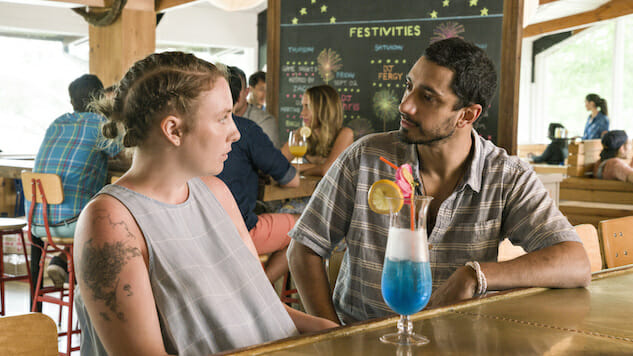Girls: “All I Ever Wanted” Mixes the Sweet and the Bitter
(Episode 6.01)
Mark Schafer/HBO
Kathryn VanArendonk, writing for Vulture, defines Girls by its relationship to audiences and performers, which makes sense when you have a protagonist like Hannah Horvath (Lena Dunham), who needs to be the center of attention, and a creator (also Dunham) whose public presence tells much the same story. While I agree that its characters are performing for themselves and others (in exaggerated versions of what we all do in our daily lives), my take on the series is a bit different.
Girls is interesting not for its relatable characters (what some theorists call “first level identification,” which typical Hollywood fare goes after with its moral, cat-saving heroes), nor for our judgment of those characters (what the same theorists call “second level identification,” which we get when we hate-watch something because we relate to others hate-watching it). Rather, Girls has a third level of identification, which it creates with its dedication to representing a particular slice of society in all its lived-in reprehensibility. We recognize (even if we’ve never been there) that this may not be everyone’s New York, but it’s certainly someone’s New York. Seeing how these lives play out in this alien yet realistic environment is as strange as watching a comedy of complicated people living on an Arctic base.
Girls’ sense of specificity is both exclusive and inclusive: While we may recognize our mistakes in those of its characters, the show’s heightened punishments and rewards for these mistakes push the boundaries of what we can believe. Whether it’s a record deal for Marnie (Allison Williams) or a book deal for Hannah, it’s just hard to imagine things going well for them. “All I Ever Wanted,” the first episode of the series’ final season, stretches this further by placing its characters in false utopias and watching them begin to itch inside their self-constructed constraints.
Hannah, as the opening montage suggests, has finally gotten back to writing. Thankfully, the struggle to show writing on screen (and Hannah’s own valuation of the writing process) means we spend little time on the shots of Hannah biting her lip and clicking on emails. Instead, the montage lingers on the pride her “Modern Love” article, inspired by Adam (Adam Driver) and Jessa’s (Jemima Kirke) romance, generates in the people around her. Her family, her friends and her subjects all read the paper in wonder. It’s a montage of character updates done only as Girls could: through their appreciation of Hannah’s professional life.
Hannah spins this new spotlight into an interview. At a coffee shop, she wears a yellow, double-rider motorcycle jacket as bright as her disposition, and receives an assignment from a magazine editor (Chelsea Peretti): to experience and write about the appropriation of surfer culture by wealthy old women who’ve moved on from yoga. Of course, Hannah takes the professional opportunity to mention her vagina because she’s on-brand as an over-sharing parody. This somehow fails to faze her editor—maybe Hannah’s finally found the outlet she’s been missing.
Before embarking on this quest, the episode stops in on the other characters. Oh, and mentions that Elijah (Andrew Rannells) will be renting out Hannah’s room for an orgy (which sounds vaguely like a fellow critic’s AirBnB horror story) while she’s away.
-

-

-

-

-

-

-

-

-

-

-

-

-

-

-

-

-

-

-

-

-

-

-

-

-

-

-

-

-

-

-

-

-

-

-

-

-

-

-

-








































